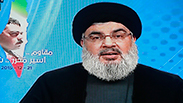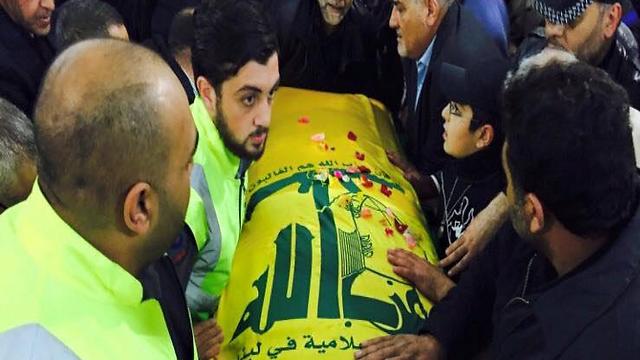
Hezbollah leader Nasrallah. Israel must make its intentions clear in advance
צילום: EPA
In next Lebanon war, Israel must target Beirut
Op-ed: If and when hostile activities begin from Lebanese territory, they should lead to a war between Israel and Lebanon. If we only try to defeat Hezbollah and leave Lebanon 'out of the game,' the results will be a lot grimmer than in the previous war.
Samir Kuntar's assassination, the rocket fire from Lebanon the next day and Hezbollah Secretary-General Hassan Nasrallah's threatening speech have raised the fear of a new conflict on the northern front.

Beyond an analysis of the likelihood of such a conflict, it's important to address our policy vis-à-vis Lebanon, vis-à-vis Syria, and indirectly vis-à-vis Turkey and Russia as well, which are in the midst of a conflict over the situation in Syria.
We can cautiously say that Kuntar's assassination will not serve as a trigger for a conflict in the north. The man was not important enough for Hezbollah, and in general, Hezbollah has no interest in launching another front due to the organization's growing entanglement in Syria.
This reality could change as a result of an incident which will lead to a response and counter-responses following a change in reality and a change in the list of priorities of Hezbollah or its patron (Iran).

Samir Kuntar's funeral, Monday. The man was not important enough for Hezbollah to launch a new conflict
As far as Israel is concerned, it's important to stick to one principle: If and when hostile activities begin from Lebanese territory, they should lead to a war between the State of Israel and the state of Lebanon. In the Second Lebanon War we tried to defeat Hezbollah alone, leaving the state of Lebanon, its government, army and infrastructure "out of the game." If that's the way we run the third Lebanon war, the results will be a lot grimmer than in the previous war.
How? Allegedly, we have improved significantly since 2006. The problem is that on the tactical level, and mainly in terms of the number of rockets, their size, range and accuracy, Hezbollah has relatively improved much more than we have. So if there is such a conflict, and if it lasts 34 days (like the Second Lebanon War), the damage, casualties and destruction in the State of Israel will be unbearable.
The conclusion is simple: The next war will be waged against the state of Lebanon. In addition to Hezbollah targets, we should also attack the Lebanese army, the infrastructures in Lebanon, the airports and seaports and any other strategic assets. Since no one in the world (Syria and Iran on the one hand, and Saudi Arabia, Europe and the United States on the other hand) is interested in Lebanon's destruction, and since that will be the inevitable result of an all-out war between Israel and Lebanon, there will be huge global pressure on all sides to reach a ceasefire after three days rather than after 34 days, and that's exactly what Israel needs.
Israel can allegedly decide on the right strategy only when the conflict begins, but that was precisely the big mistake of 2006. It's crucial to explain to the world, and especially to the US, the policy you are planning to take in advance and in a clear manner.
There will be a double benefit here: First of all, it will make it possible to prevent the war, as the majority of the world is indifferent to any damage to Hezbollah (or to Israel) but will not be indifferent to the possibility of Lebanon's destruction; secondly, when a war breaks out, it's too late to convince the world that the way you chose to fight is the right one.
Israel's policy in regards to Syria is more complicated. For now, we can be passive and intervene only when there is a need for a concrete thwarting. Our influence over the situation in Syria is very limited, yet it should still be made clear that it's better for Israel to support the Russian approach which talks about reaching an agreement in Syria, with or without President Bashar Assad, than support the collapse of the current regime. It's true that a downfall of the Syrian regime will hurt Iran and Hezbollah, but not everything that is bad for my enemy is necessarily good for me.
The collapse of the government in Syria will bring the Islamic State to our border. That may not be so bad, but an ISIS takeover of Syria will quickly lead to an ISIS takeover of Jordan, and that's a development which will dramatically aggravate our situation.
Major-General (res.) Giora Eiland is a former head of Israel's National Security Council.










